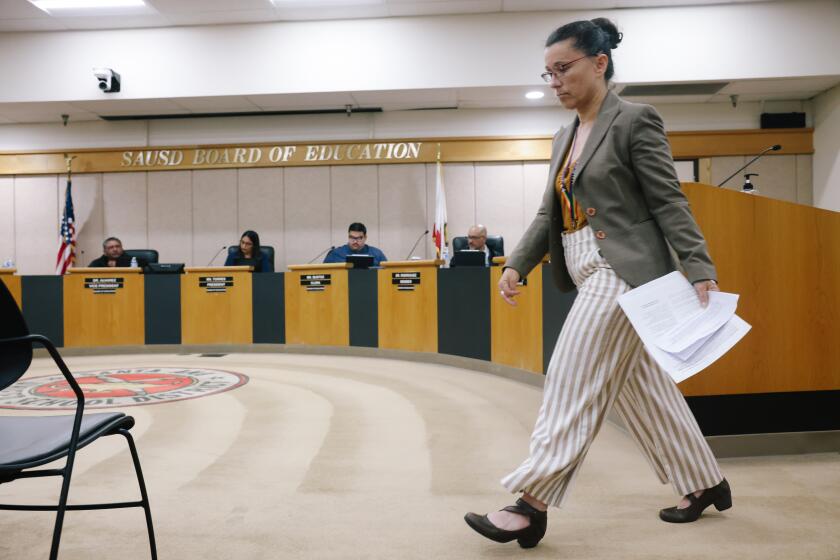Why did a Fullerton councilwoman refund donations before her Walk on Wilshire vote?

- Share via
The bollards that once blocked Wilshire Avenue in downtown Fullerton are gone and car traffic has reclaimed the former Walk on Wilshire pedestrian zone this month.
But questions remain from impassioned supporters of the onetime outdoor dining area about the Levine Act, which aims to curb “pay-to-play” politics, and a councilwoman’s vote that deadlocked the City Council vote Jan. 21 and effectively ended Walk on Wilshire.
Campaign finance documents show that newly elected Councilwoman Jamie Valencia returned a $2,500 contribution from Tony Bushala, a Wilshire Avenue property owner, and a $500 donation from the owner of 8 Eighty Cigar Lounge, a business in the former pedestrian zone, on Dec. 11, six days before she was sworn in.
During the Jan. 21 council meeting, Valencia asked Assistant City Atty. Baron Bettenhausen for clarification about her ability to discuss Walk on Wilshire’s future, since the Levine Act was invoked by Walk on Wilshire supporters.
“Council member Valencia has complied with the Levine Act,” he said. “The Levine Act does provide a disqualification when you receive a contribution and that contributor has a financial interest in an item that comes before the council. It does allow for a cure when the council member learns of the disqualification, they can return the contribution.”
The law originally applied to appointed board members and commissioners before being expanded in 2023 by state legislators to cover local elected officials.
Prior to its expansion, some Anaheim City Council members sought to adopt campaign finance reform modeled on the law in the wake of an FBI political corruption probe that led to a criminal conviction against former Anaheim Mayor Harry Sidhu.
More recent updates this year marked the threshold up to $500 for contributions that trigger the law’s voting prohibitions while giving officials 30 days to return donations received in the past 12 months before a potentially prohibited vote.
A donor’s financial interests under the law are defined as a “license, permit, or other entitlement for use.”
When asked what financial interests triggered the Levine Act for Valencia, Bettenhausen told TimesOC that it was the responsibility of the councilwoman to address that.
San Clemente City Council decided against making food distribution contingent on a permitting process, a proposal critics saw as against the homeless.
“As city attorneys, our office provides our clients, the city and its officials, with advice on the numerous conflicts-of-interest laws including the Levine Act,” he wrote in an email. “We do not, however, investigate or enforce alleged violations or track each campaign contribution received.”
Valencia had been in regular discussions with the city attorney’s office prior to the refunds.
“I returned the contributions made by both Tony Bushala and the owner of the cigar store at an abundance of precaution because I knew I was going to have to deliberate on the matter once sworn in,” she wrote in an email to TimesOC.
Valencia referred any direct questions about what prompted the Levine Act refunds back to the city attorney’s office.
“I find it very interesting that the money was returned, and according to the [city] attorney, the letter of the law was followed,” said Fullerton Councilman Ahmad Zahra. “Anybody can then donate money ... and then later on when a council member doesn’t need it, they’ll return it and take the vote.”
In the lead up to the vote, Bushala threatened legal action against the city in November if it didn’t reopen Walk on Wilshire, which he claimed harmed property values.
“I have no licenses, permits, or entitlements with the city of Fullerton,” Bushala said when reached by TimesOC. “I haven’t done anything related to entitlements in well over 25 years.”
He didn’t know why Valencia returned his campaign contribution.
Opponents of Walk on Wilshire point to a Palo Alto case where the Fair Political Practices Commission ruled that a city council’s decision to close a street to vehicle traffic wasn’t considered an “entitlement for use” proceeding under the Levine Act.
When asked by TimesOC, an FPPC spokesperson said that the law with regard to a street reopening “depends on the specific facts and circumstances of each case.”
Zahra relayed lingering concerns from Walk on Wilshire supporters about it in a Jan. 26 email to Fullerton City Atty. Dick Jones, Bettenhausen and City Manager Eric Levitt.
He asked on their behalf if the FPPC had been consulted on the refunds and sought to have the city delay the reopening of Wilshire Avenue to avoid any potential legal challenges.
“Valencia may not have needed to do this at all, because there may not have been direct financial interests,” Zahra later told TimesOC. “What we do know, is that the way it happened just did not sit well with the public, and certainly raised a lot of questions about the integrity of the process.”
The street ultimately reopened this month.
While Valencia and the city attorney’s office punted questions about the Levine Act to each other, TimesOC filed a records request regarding any requests to “grant, deny or revoke any licenses, permits or entitlements for use” along Walk on Wilshire over the past year.
No such documents existed.
All the latest on Orange County from Orange County.
Get our free TimesOC newsletter.
You may occasionally receive promotional content from the Daily Pilot.





